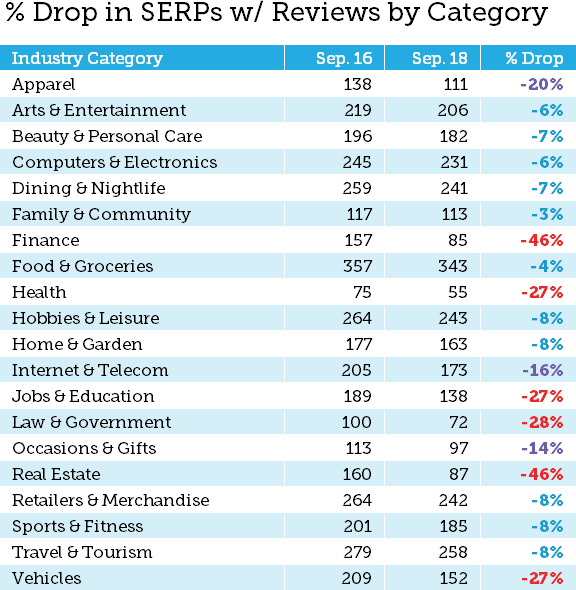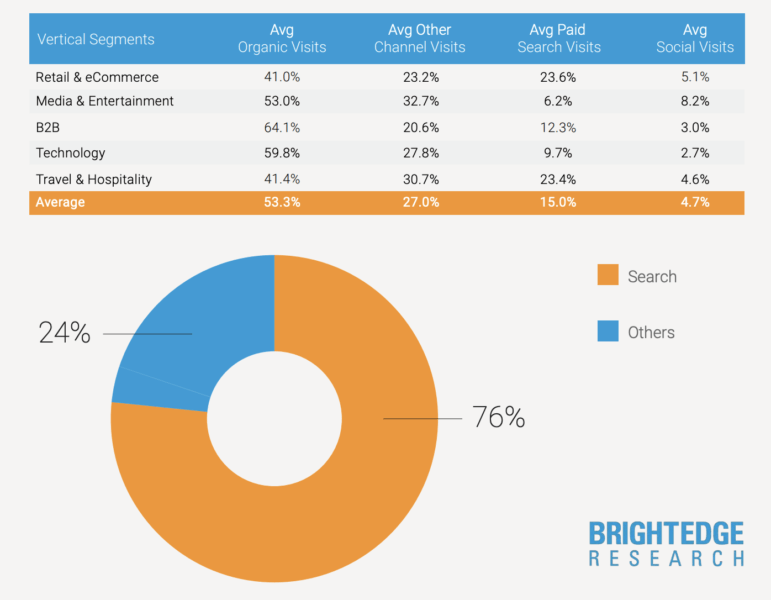Damian Rollison | Sep 30, 2019 7:00:00 AM
5 Min Read
In today’s Monday Memo, catch up with the latest on Google’s algorithm update; Facebook’s new AR mapping tech; Amazon’s visual recognition; the loss of gold stars in SERPs; opting out of “Order Online” in GMB; and a new study showing the dominance of organic search.
Google announced its September 2019 core algorithm update on Tuesday of last week, and it wasn’t long before the SEO community started noting the impact. For the most part, local business sites appear to have experienced an uptick in ranking, a welcome change after the hit many took from the last major update in June. But as with many such algorithm changes, the results are hard to quantify and differ significantly from one site to the next. Among several commenters quoted in a recent writeup on Search Engine Roundtable, many noted what commenter Glenn Gabe called “a lot of volatility in the health/medical space,” with some sites gaining and others losing. Roger Montti, writing in Search Engine Journal, suggested that link spam also appears to have been a target of the update.
During its Oculus Connect 6 event last week, Facebook announced that the company is working on its own version of AR glasses, conceptually similar to Google Glass, as well as a spatial mapping technology called Live Map that is meant to go hand in hand with the glasses and provide rich contexts around a precisely mapped external world. Facebook claims it will build Live Map through a combination of crowdsourced data and its own technology, and that the resulting map will layer together location, external appearance, and a semantic understanding of objects and their relationships. In a video, Facebook describes Live Maps as a means for users to gather information and share experiences about the world more intuitively, with examples including movie times and reviews displaying when a user looks at a theater marquee.
Video courtesy Facebook
Amazon has released a new visual recognition feature for its Echo Show devices, aimed at the needs of blind and vision impaired users. The news adds Amazon to the list of companies experimenting with visual search. A user can simply hold up an object in front of the Echo Show device and ask, “Alexa, what am I holding?” The device then verbally identifies the object using Amazon’s “advanced computer vision and machine learning technologies for object recognition,” according to the company. The new feature arose out of Amazon’s Alexa for Everyone initiative, aimed at improving the usefulness of Alexa devices for people with disabilities. Anyone with a first- or second-generation Echo Show can enable the feature by asking, “Alexa, what am I holding?”
Many in the local SEO community are noting a significant drop in sites displaying review stars in Google SERPs after the announcement last week that Google would no longer support Schema markup for reviews of your business on your own site. Moz measured the drop in SERPs with review stars at 14% as of a few days ago, and notes that some verticals were affected disproportionately, in particular finance and real estate which both lost nearly half of their overall sites displaying review snippets. Verticals like health and law weren’t far behind, suggesting that Google may have targeted so-called Your Money or Your Life sites for special attention.

Google has created an opt-out form that lets restaurants remove the “Order Online” button from GMB listings where it appears. This button, first spotted earlier this year, connects to third-party delivery services like DoorDash and cannot be managed by businesses themselves via the GMB dashboard. The new opt-out form removes the button, but does not remove any ads third-party services may place in the restaurant’s Knowledge Panel or any booking links listed under the Order heading. Google informed me that once the button is removed via the opt-out form, it cannot be reinstated.
A new study from analytics firm BrightEdge reaffirms that organic search is the dominant channel for driving traffic to business websites, far outpacing the volume of users that reach websites via paid search, display ads, or social platforms. The study finds that 76% of all site visits originate with search, with 53% of all traffic deriving from organic search and 15% from paid search. The share of organic traffic has grown from 51% in 2014. Social sites make up only about 5% of referring traffic, with other channels such as display making up 27%. The study underlines what we already intuitively know: most users find their way to business websites via organic search.

Topics: Monday Memo

VP of Market Development and Strategic Partnerships
Offer Post Justifications Spotted in Local Results
Oct 4, 2021 8:47:46 AM
Monday Memo: More than Brands and Influencers, Consumers Trust Each Other
Sep 27, 2021 7:56:34 AM
Monday Memo: Google Adds “Latino-Owned” to GMB Identity Attributes
Sep 20, 2021 7:58:58 AM
Monday Memo: New Study Shows 94% of Consumers Use Online Business Directories
Sep 13, 2021 7:16:55 AM
Monday Memo: The Page Experience Update Has Fully Rolled Out
Sep 6, 2021 7:43:45 AM